While the question, “Do mealworms bite?” might come across as somewhat strange or even trivial to some, a deep dive into this subject reveals intriguing facts and insights into mealworm behavior, physiology, and their relationship with humans and pets.
No, mealworms do not bite humans, pets, or other animals in the way that one might commonly understand the term “bite.”
However, their chewing mouthparts can grind down materials like grains and fruits, which can sometimes be mistaken for biting.
Stay tuned as we delve into mealworm behavior, biology, and the misconceptions that surround the question of whether they bite.
Before you scroll further down this guide, check out these other animal-related articles: Do Axolotls Bite? and Coyote Bite Force: How to Measure It and What It Means.
Table of Contents
Why Do People Think Mealworms Bite?
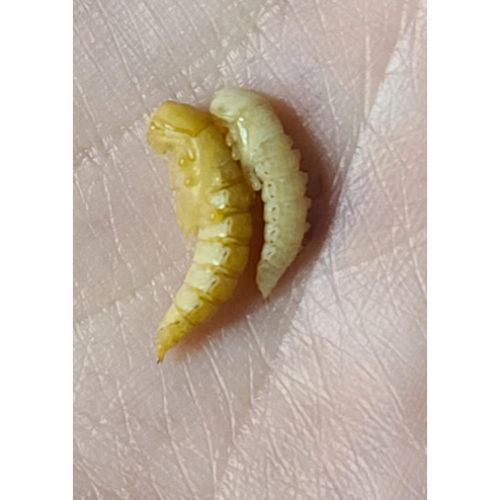
The notion that mealworms bite can be tracked back to their appearance and misinterpretations of their eating behavior.
Unlike some insects, such as ants and mosquitoes, mealworms have mandibles designed for grinding rather than piercing.
These mandibles can look intimidating under magnification, leading to the misconception that mealworms bite.
Another factor contributing to the myth is the role mealworms play in the decomposition process.
Since they feed on decaying organic matter, some might mistakenly assume that they could “bite” or “eat” living tissue, which is not the case.
What Is The Anatomy of a Mealworm’s Mouth?
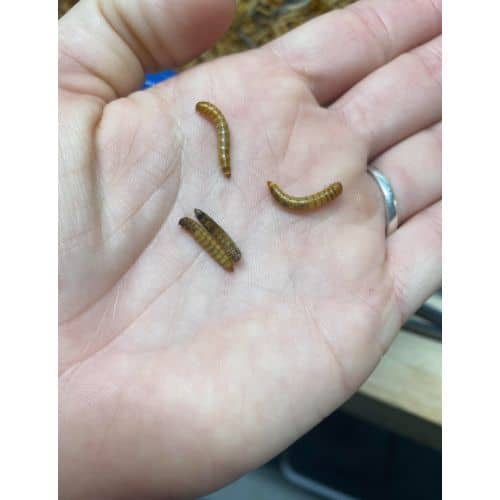
The anatomy of a mealworm’s mouth is fascinating and quite specialized for its natural activities, which primarily involve consuming decomposed matter, grains, and vegetables.
Mealworms have chewing mouthparts that consist of:
- Mandibles: Strong, opposing grinding surfaces used to grind food (mastication.)
- Maxilae: Secondary jaws that help in manipulating food
- Labrum and Labium: Upper and lower lips that help in holding food items.
These components work in unison to enable the mealworm to consume its typical diet but are not equipped to bite into human skin or other hard substances effectively.
What Do Mealworms Typically Eat?
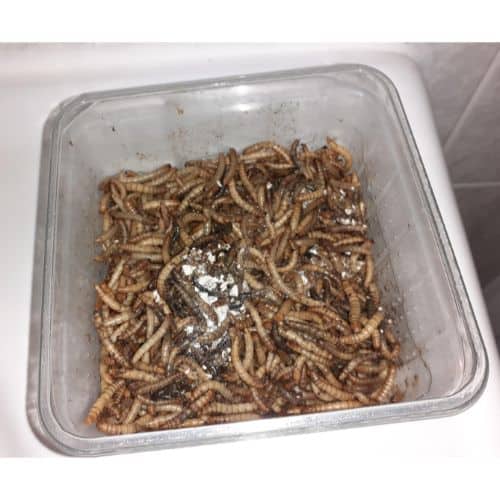
Understanding what mealworms eat can help clarify why they need to bite in the conventional sense. Their typical diet consists of:
- Grains: Such as oats, wheat, and bran.
- Decomposing Leaves: They are detritivores, helping in breaking down decaying plant matter.
- Vegetables and Fruits: Soft, moisture-rich foods like carrots and apples are also consumed.
- Pet Food: Often used as a protein source in reptile and bird diets.
This diet requires masticating, which their mouthparts are optimized for, rather than biting or piercing.
Can Mealworms Bite Other Animals or Insects?
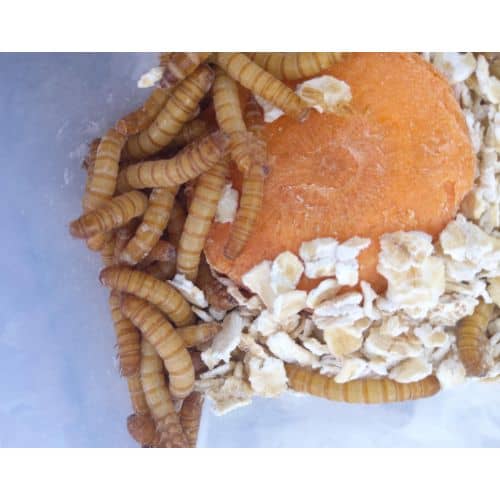
Mealworms do not possess the ability to bite or harm other animals in a way that other predatory insects do.
They are detrivores, consuming decomposed organic matter, including plant material and grains.
Mealworms do not have stingers, nor are they capable of grabbing or biting with any amount of force that can damage any other creature.
Their primary focus is on foraging and consuming enough nutrients to transition to their next stage in life.
While they are part of the food chain, serving as a food source for other animals like birds and reptiles, they do not have the offensive capabilities to fend off predators through biting.
Can A Mealworm Bite Me?
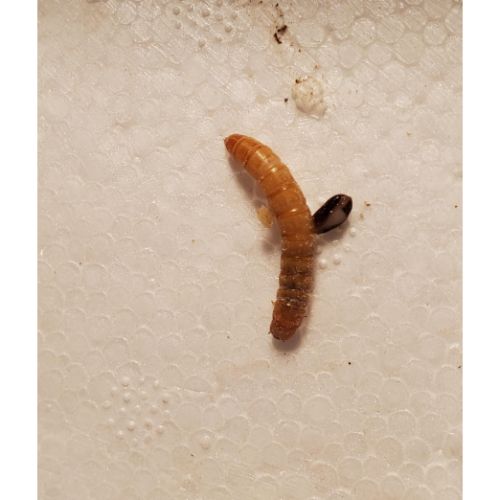
As we’ve mentioned previously, mealworms cannot bite humans.
Their mandibles are adapted for grinding down decomposed organic matter, not for biting through the skin of larger animals like humans.
While their mouthparts are involved in the ingestion of food, they simply are not built to exert the force required to break human skin.
If a mealworm were to crawl on your hand and try and bite you, you would not feel anything other than the insect’s movement.
The mandibles do not have the strength to even cause discomfort, let alone break your skin.
What Happens If A Mealworm Bites Me?
Given that Mealworms don’t have the capability to bite through human skin, there are no health risks associated with a bite from a mealworm.
While some people might find the sensation of a mealworm crawling on their skin unsettling, this is not due to the insect attempting to bite you but is more of a psychological response.
If you were to come into contact with a mealworm, you might feel its tiny legs and perhaps the tips of its mandibles moving across your skin, but there won’t be any physical harm whatsoever.
Are Mealworms Harmful?
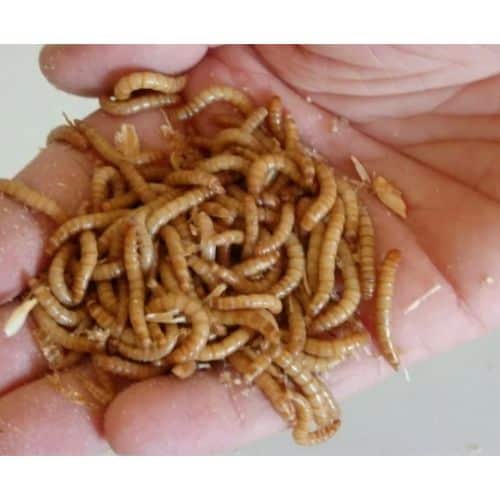
Mealworms are not harmful to humans, pets, or larger animals. They are often used as a food source for a variety of pets, including fish and reptiles.
They are rich in protein and are considered a sustainable food option for animals.
However, if the mealworms have been sourced in a way that is harmful, as in, they may have contact with pesticides or harmful chemicals, they could pose a risk if ingested by pets.
Why Do People Use Mealworms As Food?
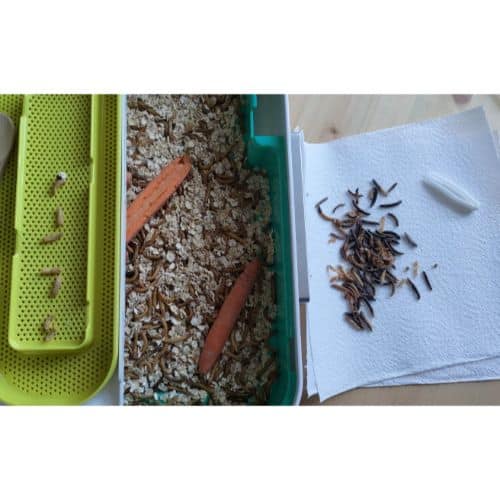
Given that mealworms are not harmful and cannot bite, they are commonly used as a food source in pet care.
They are rich in essential nutrients like protein, fiber, and fat, making them a well-balanced food for certain animals.
The farming of mealworms is also considered environmentally sustainable, requiring less water and producing fewer greenhouse gases compared to traditional livestock.
Mealworms are also being researched as a protein source for human consumption, as they can be efficiently farmed and are highly nutritious.
Some advocates also propose mealworm farming as a part of the solution to global food security challenges.
Can Mealworms Carry Diseases?
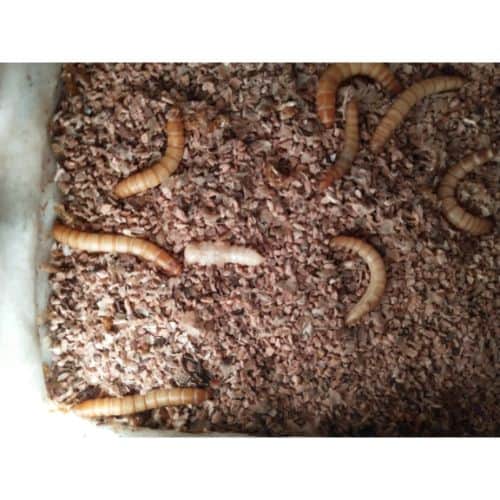
No, mealworms do not carry diseases, and there is no conclusive evidence to suggest that they do.
They are considered for handling and are commonly used in educational settings for biology experiments.
But, as with any organism, good hygiene practices should be followed when handling mealworms to minimize any potential, albeit unlikely, risk of contamination.
What Other Uses Do Mealworms Have?
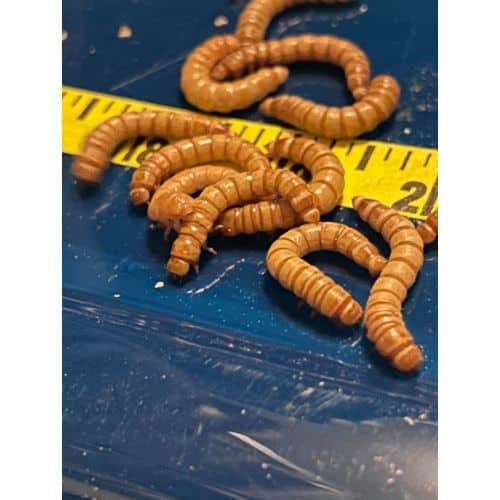
Apart from their use as a food source for various pets and even humans, mealworms show other interesting applications.
For example, they have shown promise in the degradation of plastic, with certain strains being able to consume and break down polystyrene into organic waste.
This intriguing capability has led to further research into using mealworms for waste management, particularly in tackling the global plastic waste crisis.
Conclusion For “Do Mealworms Bite”
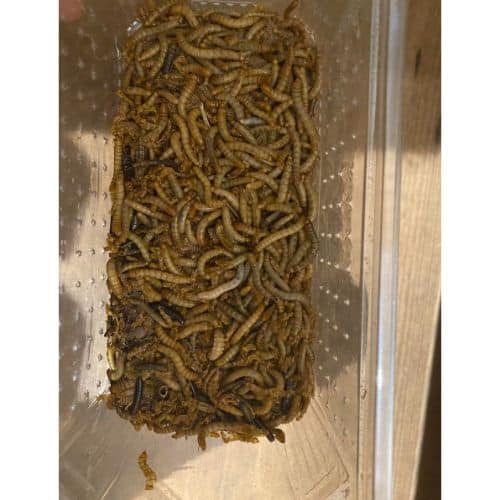
To reiterate, mealworms do not have the capacity to bite humans or pets.
Their role is primarily as a food source for various animals, and they are not considered harmful.
They are a sustainable choice, both as animal feed and potentially even as a human food source.
It’s essential, however, to source mealworms responsibly to ensure they are free from contaminants and to adhere to good hygiene practices when handling them.
If you find this guide, “Do Mealworms Bite,” informative and helpful, you can check out these other animal-related articles from our team:
- Why Do Dogs Bite Each Other on the Neck?
- Why Does My German Shepherd Bite Me?
- What Is The Belgian Malinois Bite Force?
You can learn more about mealworms by watching “Your Top 10 Mealworm Questions Answered!!” down below:




